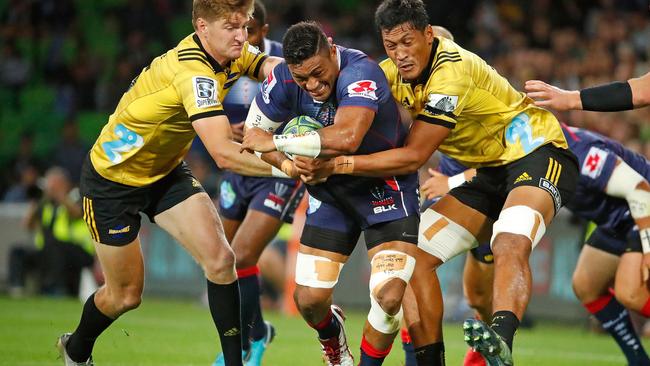Rebels with work to do after lesson from the Hurricanes
There was never any realistic hope of putting together a Melbourne side from scratch to beat the Hurricanes.

he harsh reality is that there was never any realistic hope of putting together a Melbourne side from scratch, playing them for five matches and then expecting them to defeat a Hurricanes side that have won 80 per cent of their matches under coach Chris Boyd, Rebels coach Dave Wessels admitted yesterday.
Wessels is as optimistic as anyone in his cutthroat position must be, but against a side that included the world’s best player in Beauden Barrett, the world’s most combative halfback in TJ Perenara, a string of actual or would-be All Blacks and a record of 46 wins from 57 games under Boyd, reality always dictated there would be one winner. And it was doubly the case given the Rebels effectively were an amalgam of the Melbourne and Perth squads of 2017.
The Hurricanes have won four matches in succession since being ambushed by the Bulls in Pretoria in the opening round of this year’s competition and, significantly, are unbeaten in matches against fellow NZ sides this year.
The Rebels’ defeat was the 33rd successive defeat for an Australian team at the hands of their Kiwi rivals but even that statistic becomes almost self-fulfilling, as it is constantly hurled at the Australian sides in the lead-up to trans-Tasman matches.
Had the first trans-Tasman opponent been, for instance, the Blues — thrashed by the Sharks 63-40 on Saturday, just one week after being humiliated 46-14 by the Rebels — it might well have been a different story.
“We’ve got work to do,” said Wessels as the Rebels regrouped yesterday from Friday night’s 50-19 defeat. “But I knew that going into the game. They controlled the field, they controlled possession and we didn’t have any mechanisms to get the ball back. That’s one of the things that we as a team have to work on: how do we control the tempo of the game rather than allowing the opposition to control it?”
The Rebels departed from their systems on two occasions the Hurricanes scored tries against them in the first half.
In the first instance, they attempted to run the ball out from behind their own goalposts as Tom English fed Jack Maddocks. In the second, Jack Debreczeni perhaps foolishly trusted the bounce of the ball but instead of it going dutifully into touch, as seemed inevitable, it bounced perversely into the hands of Hurricanes winger Ben Lam for a runaway try.
That try had the same sense of momentum-changing inevitability about it as when Ben Youngs’ crosskick tantalisingly brushed the sideline only to be toed ahead by winger Eliot Daly when England beat Australia at Twickenham last November. From being 19-11 behind, the Hurricanes drew up to 19-18 and then took the lead — never to relinquish it — when Barrett scored on the stroke of halftime.
“For long parts of the game, especially in the first half, I thought we were playing really good rugby,” Wessels said.
Certainly he has no intention of advising his rampaging No 8, Amanaki Mafi, to tone down the theatrical pause when he rears up and then stamps the ground emphatically with his boots before setting off headfirst into the defensive line, the broadest of smiles on his face.
“I think Mafi is really enjoying his rugby at the moment,” Wessels said. “He was angry at the doctor for not allowing him back on the field for the second half but the fact was that he didn’t pass his (Head Injury Assessment) tests.”
With the Rebels having the bye next weekend, Mafi is almost certain to play against the Jaguares on April 14 although reserve prop Ben Daley is expected to be out of action for two to three weeks with a shoulder injury.
The Rebels will remain on top of the Australian conference with 20 points from six matches, although the Waratahs (14) and the Reds (13) could both make up ground when they play the Sunwolves (2) in Tokyo and the Brumbies (9) in Canberra respectively.
The match at GIO Stadium looms as a must-win for the Brumbies, who have lost all three matches to fellow Australian sides in the Australian conference.
Perhaps the biggest surprise of all came when they fell 18-10 to the Reds in Brisbane, losing to six penalty goals to two unconverted tries, but the reality is that Queensland are building a formidable reputation based on their defence.



To join the conversation, please log in. Don't have an account? Register
Join the conversation, you are commenting as Logout